LeadHER: Mentoring the Next Generation of Women Leaders
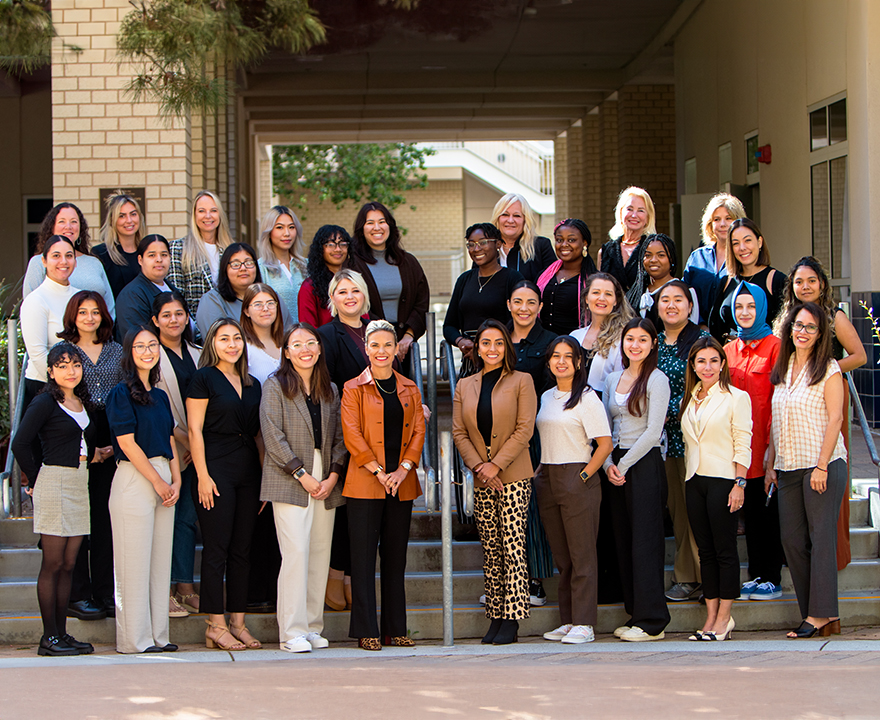
LeadHER: Mentoring the Next Generation of Women Leaders
- December 4, 2023
- Pilot program launched by the UCI School of Social Sciences and Women of the Dean’s Leadership Society is wrapping up its first quarter on campus
-----
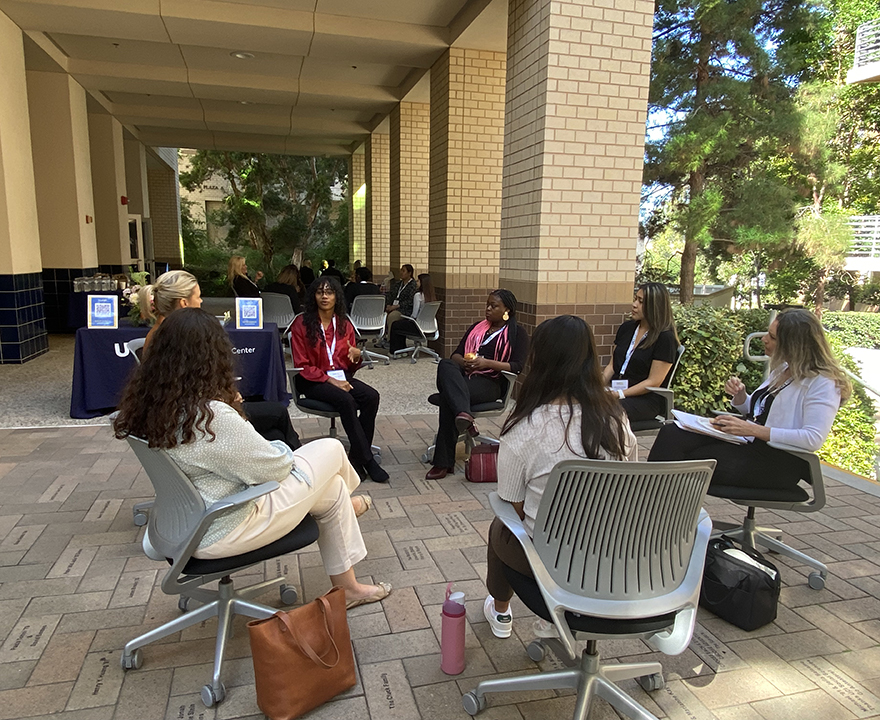 The women gathered in small groups in the Social Sciences Plaza on Tuesday mornings
this fall were preparing for their futures. They were meeting c-suite executives,
business owners, and community leaders – many of whom are UCI graduates themselves
– who wanted to share the wisdom gained from their years of experience with a new
generation of women leaders: UCI social sciences students.
The women gathered in small groups in the Social Sciences Plaza on Tuesday mornings
this fall were preparing for their futures. They were meeting c-suite executives,
business owners, and community leaders – many of whom are UCI graduates themselves
– who wanted to share the wisdom gained from their years of experience with a new
generation of women leaders: UCI social sciences students.
Through LeadHER, a course offered by the School of Social Sciences for the first time this fall, students engaged in a structured 10-week mentorship program aimed at setting women up to become successful leaders and fostering connections that will support them professionally for years to come.
“This mentorship program is different because we are lifting up women, and it is so clear how eager they are for that,” says Amanda Fowler, ’99, Vice President of Global Corporate Giving at Edwards Lifesciences and one of the mentors. “It’s not that they are hungry to climb the corporate ladder – they are hungry to be successful at life.”
Extraordinary league of women
Long before she became the leader of philanthropy for Edwards – which employs 19,000 people around the globe in developing life-saving medical technologies – and even before she was an economics student at UCI, Fowler grew up in a household that believed women were just as capable as men.
“I’ve been raised to think being a woman was an advantage, and when I mentor women, I tell them that,” says Fowler. “If you show up and do the work, you will be successful. That’s true now more than ever because the world is recognizing that women are critical contributors.”
Research is catching up to that idea. Recent studies have found that teams with a gender balance are more profitable than male-dominated ones; companies with at least one woman on their board outperform those with all-male boards; and women tend to outperform men on many measures of leadership.
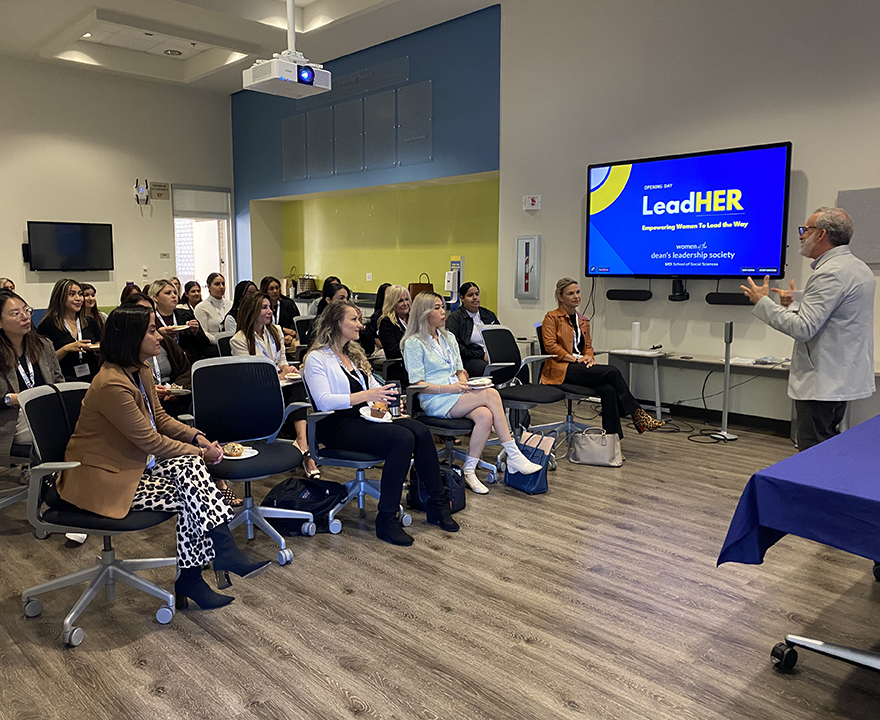 Fowler and the other LeadHER mentors are members of the School of Social Sciences’
Women of the Dean’s Leadership Society, the first group of its kind at UCI. Like the students they are mentoring, the women
come from a variety of backgrounds, including some who earned college degrees later
in life or made major career changes.
Fowler and the other LeadHER mentors are members of the School of Social Sciences’
Women of the Dean’s Leadership Society, the first group of its kind at UCI. Like the students they are mentoring, the women
come from a variety of backgrounds, including some who earned college degrees later
in life or made major career changes.
“They are an extraordinary league of women who have a wide range of networks, insights and teachings,” says Jeanett Castellanos, associate dean of undergraduate studies in the School of Social Sciences, who helped create the course. “Importantly, these are professional women who want to mentor, make a difference in our students, and help lift, sponsor and promote the next generation.”
Complementary curriculum
The small group “learning circles” where students meet with mentors is just one component of the for-credit course. The syllabus, developed in collaboration with the mentors, includes readings on women in the workplace, leadership skills, communication and identifying one’s strengths. The supplemental materials were selected especially to complement the lessons and wisdom the mentors wanted to share in their small group discussions. Practice career skills are covered, too, such as leveraging LinkedIn for networking and job searches.
“Everything is geared toward career development and how to thrive in the workforce as women,” says Vidhi Vivek, a third-year student majoring in quantitative economics.
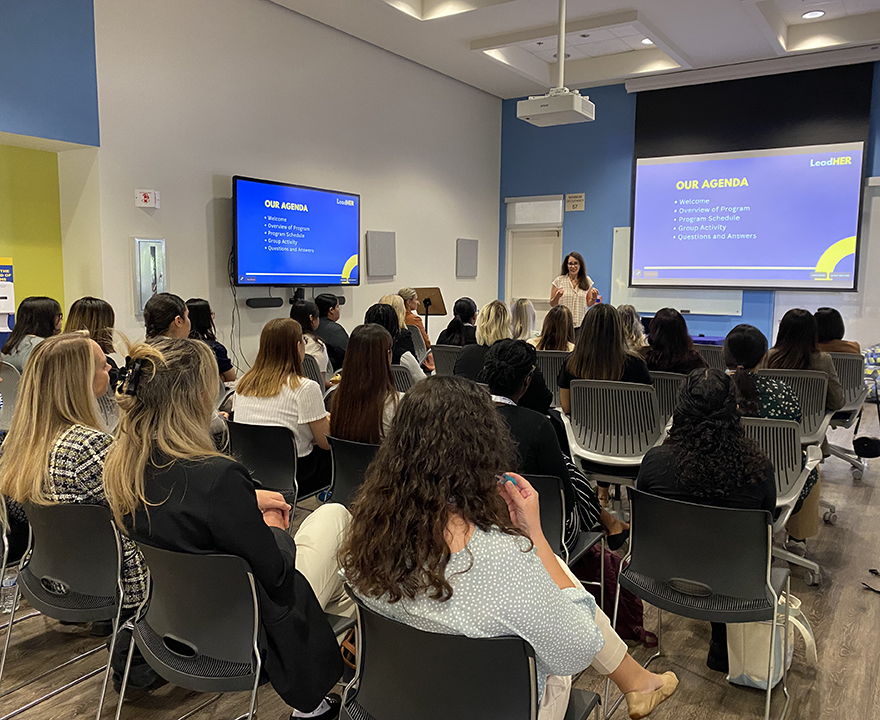 Vivek, who aspires to earn a doctorate, felt a special connection with Eileen Zimmerman ’98. Also an economics major, Zimmerman shared her story of working in the software industry,
where she was often the only woman in a conference room of men – an experience that
resonated for Vivek. The many connections between the mentors and mentees has created
a professional network that the students can leverage as they pursue their own careers.
Vivek explains, “Tomorrow, if I reached out to one of the mentors, I know that they
would respond and be more than happy to help out, because of this program.”
Vivek, who aspires to earn a doctorate, felt a special connection with Eileen Zimmerman ’98. Also an economics major, Zimmerman shared her story of working in the software industry,
where she was often the only woman in a conference room of men – an experience that
resonated for Vivek. The many connections between the mentors and mentees has created
a professional network that the students can leverage as they pursue their own careers.
Vivek explains, “Tomorrow, if I reached out to one of the mentors, I know that they
would respond and be more than happy to help out, because of this program.”
Creating community
While the students learn from the mentors, they say they feel a growing sense of community among the participants – many of whom have opened up about their past challenges and current pressures through in person learning circles and the course’s active online discussion board.
“I feel like it's harder for women to get a sense of community together in a male-dominated space,” said Lisandra Barrera-Rising, a transfer student majoring in social policy & public service. “We can be more vulnerable and open, have a little bit more trust in this setting, especially because some of us are non-traditional, so that means we come with kids and families.”
The undergraduates in the inaugural LeadHER cohort come from a variety of backgrounds, majors and interests. Barrera-Rising and the other mentees were nominated by faculty members before going through an application and interview process. The selected students demonstrate campus engagement, leadership and a commitment to the community, and many have professional goals that include working for social change or continuing their education with advanced degrees.
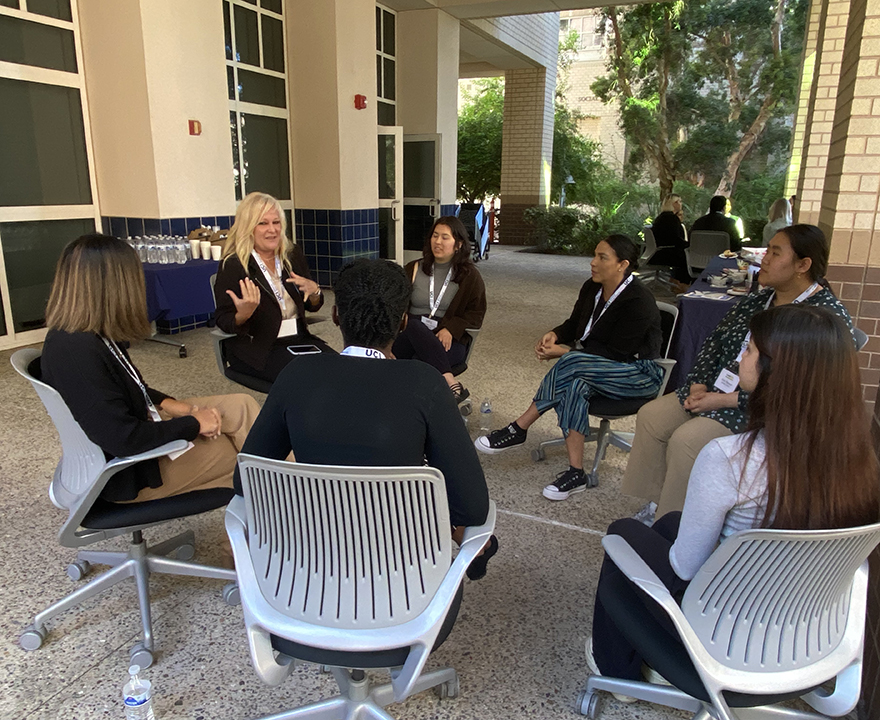 “Every one of these students has faced challenges that make them better, stronger
and more open to growth,” says Fowler. “They are bold, they are ambitious, they are
kind, and they are vulnerable.”
“Every one of these students has faced challenges that make them better, stronger
and more open to growth,” says Fowler. “They are bold, they are ambitious, they are
kind, and they are vulnerable.”
“I’ve heard stories of wisdom from these young women that are really helping shape my work and what I do – I feel that I have learned from the students just as much as I am giving to them,” Fowler says. “That’s the beauty when you lean into this type of work.”
Beyond success
Mentor and WDLS founding member Sharlene Grover agrees that the students are teaching her as much as she is teaching them. As a parent, she is learning firsthand about this generation’s pressures and perspectives.
Grover also knows the power of a good mentor to change one’s life. While she was working her way through college in Texas as a temp, a woman executive took her under her wing. First, she hired her into a full-time executive assistant job, with better pay and flexibility to work around her classes. Then, the mentor helped Grover transition to an even higher paying job in the auditing department. And when Grover eventually realized that she found auditing unfulfilling, that same mentor encouraged her to follow her dreams and move to Southern California.
That experience is one of the reasons Grover wants to make sure students tap into their own intuition on their career journeys, which might include changing course now or in the future. Students will read her essay, “Discovering Your True Self,” as part of a session about self-reflection and living a purposeful life.
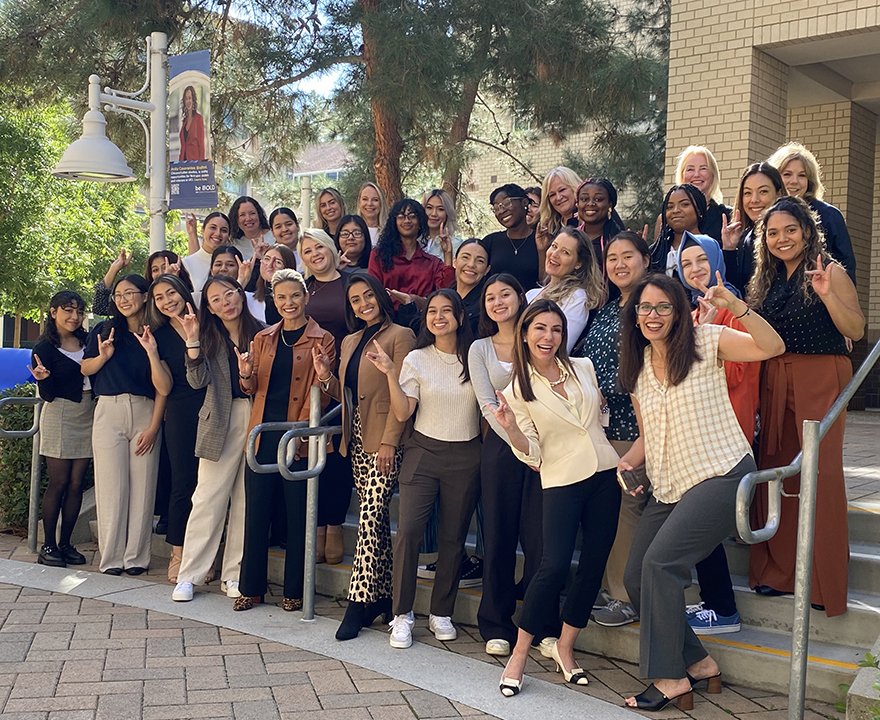 “There’s the social pressure, parental pressure, pressure you put on yourself, that
we have to peel away like the layers of an onion to figure out what you love and want
to be doing,” says Grover. “Then you can work toward finding your career, your goals
and your purpose – and that’s a process of discovery that we continue for the rest
of our lives.”
“There’s the social pressure, parental pressure, pressure you put on yourself, that
we have to peel away like the layers of an onion to figure out what you love and want
to be doing,” says Grover. “Then you can work toward finding your career, your goals
and your purpose – and that’s a process of discovery that we continue for the rest
of our lives.”
The mentors and faculty who helped create LeadHER say they hope to continue evolving the course and offering it to future cohorts.
“I hope the women grow from this experience, and that they realize the gift that they are to the world,” Fowler says. “I also hope that we prove the value of this class, with credit, so that it’s an opportunity that can be shared across the university.
“Creating community and connection is so important, not just during their years as a student, but keeping that connection alive long after they graduate,” she adds. “That’s what will make UCI a stronger, more vibrant learning institution.”
-Christine Byrd for UCI Social Sciences
-pictured: Mentors and mentees at LeadHER’s inaugural meeting in early October. Participants
heard opening remarks from UCI social sciences dean Bill Maurer, LeadHER faculty member
and social sciences associate dean of undergraduate studies Jeanett Castellanos, and
then broke into small group learning circles to dialogue and connect.
-----
Would you like to get more involved with the social sciences? Email us at communications@socsci.uci.edu to connect.
Share on:
Related News Items
- Careet RightFriendship and philanthropy
- Careet RightFirst-rate advice for first-year and first-generation Anteaters
- Careet RightCastellanos named 2022-23 Chancellor's Faculty Award Recipient for Undergraduate Mentorship in social sciences
- Careet RightRiding the Academic Freedom Train: A Culturally Responsive, Multigenerational Mentoring Model
- Careet RightCastellanos elected to American Association of Hispanics in Higher Education Board of Directors


